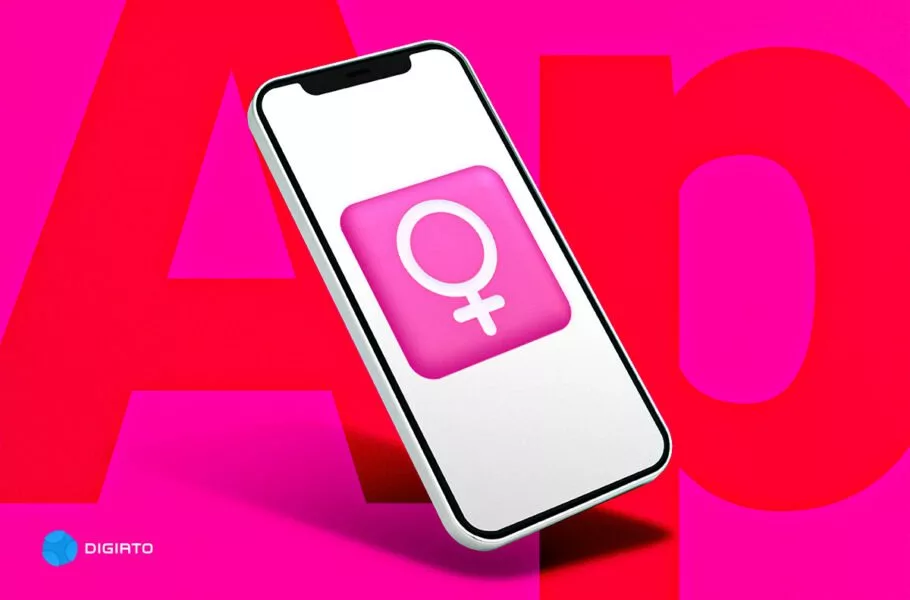
A Look at Women-Centric Apps in Iran: Digital Breakthroughs Against Taboos
Women apps In Iran are gradually breaking cultural taboos, providing women with discreet access to vital health resources.
Thirteen years ago, "Women's Health" first stepped into the digital world as an app, filling a gap in smart tools that the global market had long overlooked. Five years later, Iranian tech activists joined the movement, launching Persian-language versions into the country’s online marketplace. On the occasion of March 8, International Women’s Day—a date dedicated to spotlighting issues like gender equality, reproductive rights, and violence against women—we examine the evolution of women’s health apps globally and in Iran.
According to Digiato, the rise and growth of women’s health apps are now reaching maturity, as the digital world continues to transcend geographical and temporal boundaries, profoundly impacting individual and societal quality of life. The U.S., U.K., Canada, Germany, and Australia have pioneered the design of such apps.
Soon, these platforms expanded into broader domains like pregnancy, breastfeeding, fitness, and mental health. During the 2010s, apps like Flo and Glow gained popularity by offering advanced features such as ovulation prediction and personalized health advice. Others, like BabyCenter and Ovia, emerged to help pregnant women and new mothers navigate pregnancy stages and track their child’s development.
In Iran, similar apps are gradually breaking cultural taboos, providing women with discreet access to vital health resources. This digital shift not only empowers users but also reflects a quiet revolution in how technology can challenge societal norms and bridge gaps in women’s healthcare.
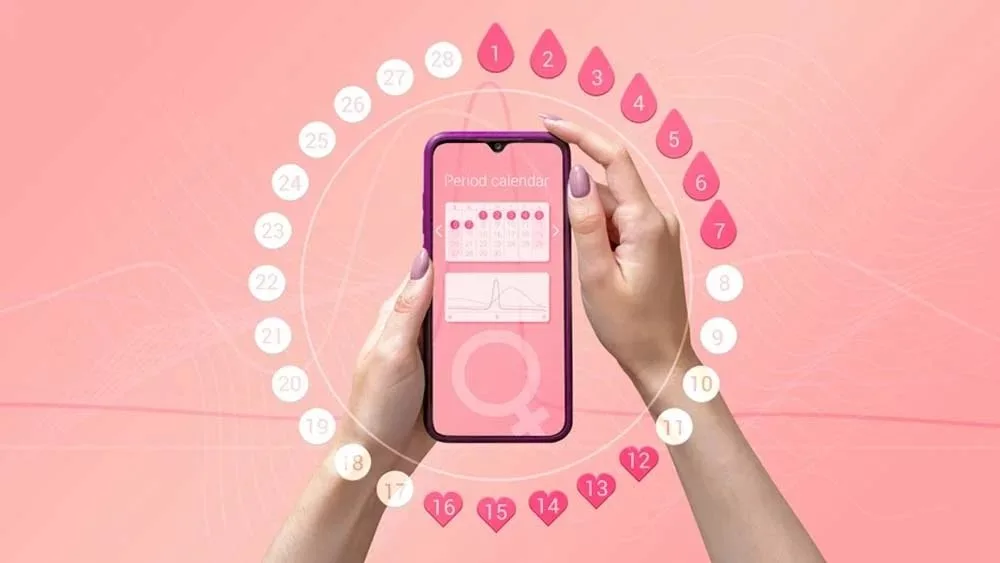
$13.2 Billion: The Global Market Size of Women’s Health Apps by 2030
The women’s health app sector is advancing rapidly, with Grand View Research, Inc. projecting the global market for these apps to reach $13.2 billion by 2030. Studies indicate that rising stress levels among working women, shifts in dietary habits, increased smartphone adoption, and a persistent lack of awareness about women’s health issues are key drivers of this growth. For example, when the U.S. introduced Flo and Germany launched Clue, their goal was to empower women to better understand their bodies—a mission that resonated strongly with users. Both apps are free but offer premium paid features for advanced functionalities.
Additionally, according to Coherent Market Insights, the global women’s health app market was valued at 3.14billion in2023 and is expected to grow to 9.27 billion by 2030. Data also reveals that menstrual health apps dominate the market, holding the largest share at 37.5%. This digital revolution underscores how technology is not only addressing gaps in healthcare access but also reshaping cultural conversations around women’s well-being on a global scale.
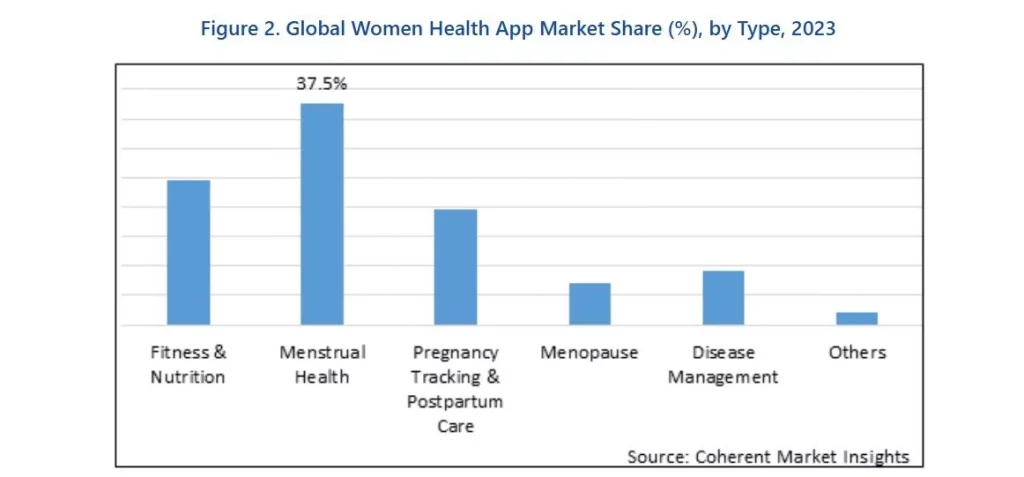
Iran’s First Steps
As the world advanced in developing women’s health apps, Iranians were not far behind. The earliest traces of Iranian efforts in this field date back to 2016-2017 (1395 in the Persian calendar), when women’s rights activists sought to address the widespread lack of awareness about health issues among women across Iran. This led to the creation of apps like Yek Zan (“A Woman”) and Toranj (“Citrus Blossom”), among the first Persian-language platforms dedicated to supporting women’s physical and mental health.
Activists in this space highlighted that the need for women’s health apps in Iran was driven by unique challenges. They emphasized the urgency of providing sexual education to help women combat domestic violence, harassment, and assault, as many lacked access to legal information or self-protection resources.
Beyond this, Iranian women’s health apps introduced features like menstrual cycle tracking calendars, enabling users to log their periods, identify irregularities, and consult healthcare providers. These tools also educated women about ovulation timing and fertility windows.
From Cycle Tracking to Cancer Prevention
In addition to menstrual management, these apps offer basic information on sexually transmitted infections (STIs), contraception methods, and breast self-exams for cancer prevention. They also include resources on marital rights and domestic violence.
Among Iran’s many women’s health apps, Yek Zan stands out for helping users track menstrual cycles, ovulation, fertility, sexual health, and mental well-being. It provides online counseling and evidence-based information to improve women’s health outcomes.
Zananeh (“Feminine”) is another app designed to assist Iranian women in managing their physical, mental, and sexual health. It features period tracking, reproductive health tools, and online medical consultations.
HerLife, meanwhile, serves as a comprehensive period tracker and health management platform. Its capabilities include online clinic consultations, free medical advice, ovulation and menstrual cycle calendars, symptom logging, and insights into premenstrual syndrome (PMS).
By integrating education, advocacy, and healthcare access, these apps are quietly reshaping how Iranian women navigate their health in a society where open dialogue about such topics remains fraught with cultural barriers.
Plan Your Pregnancy
Shabdar (“Clover”) is another app designed to manage menstrual cycles, ovulation, and reproductive health. This period-tracking tool helps users monitor their cycles and plan for pregnancy.
Numerous apps tailored for Iranian women have emerged to provide health information, expert consultations, and personalized health tracking tools. Among them is Impo, launched in 2019 (1398 in the Persian calendar). Amirhossein Sajjadi, co-founder of Impo, explained to Digiato the motivation behind the app: “Five years ago, our team recognized a gap in the online market for women’s self-care tools. At the time, foreign apps like Flo existed but were neither well-known nor user-friendly in Iran.”
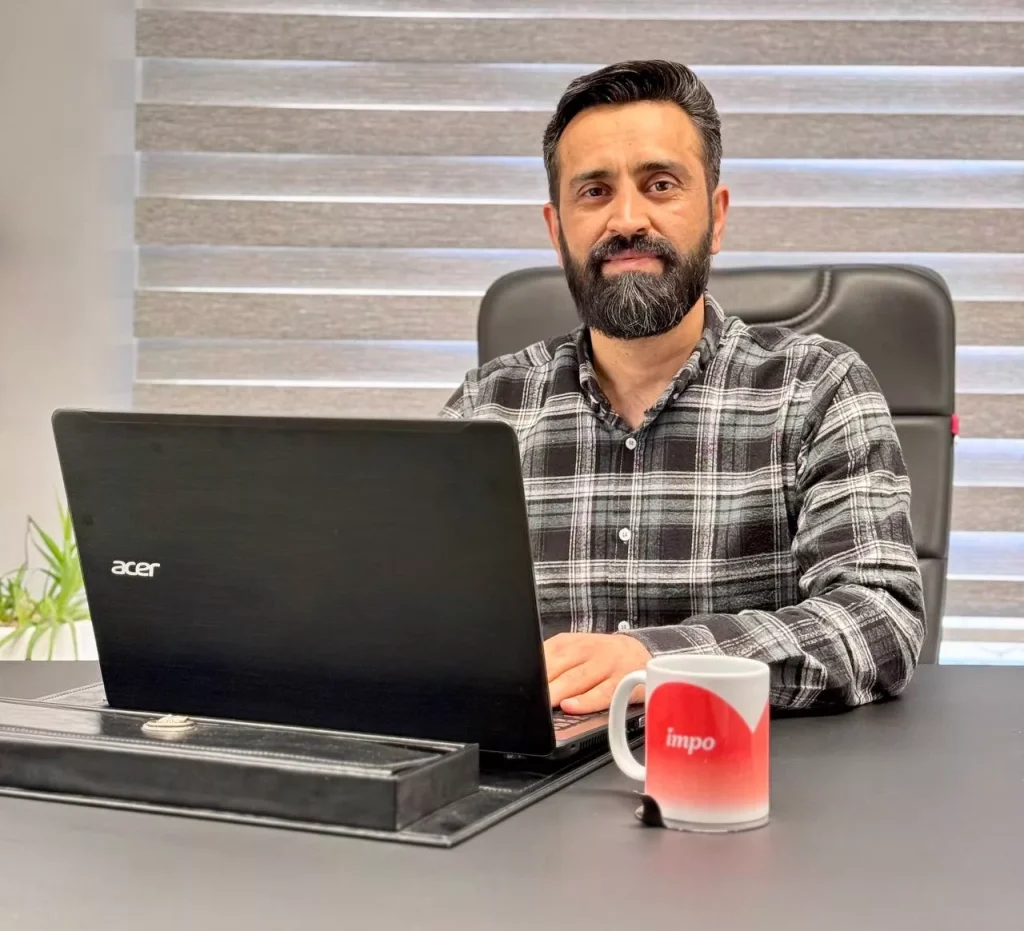
Fear of Reprimand and the Menstruation Taboo
Sajjadi emphasized that Impo was built with a “psychophysical” approach to menstruation from the start: “This perspective resonated widely because, until then, periods were treated purely as a physical issue. We were the first to design a product acknowledging the psychological dimensions of this cycle.”
He added: “Initially, even we faced uncertainty. Would users trust an Iranian app with their menstrual data? To this day, some users tell us, ‘If my father finds out I installed this app, he’ll reprimand me.’ Others ask us to delete their accounts entirely.”
Addressing the app’s social responsibility, Sajjadi highlighted the lack of public education on women’s issues: “After 2022 (1401 Persian year), when Impo shifted to a subscription model, we made it free for users with limited access or financial means—particularly girls under 20—to promote health awareness among teenagers across the country.”
By blending innovation with cultural sensitivity, apps like Impo are not only breaking taboos but also fostering a generation of women equipped to navigate their health with confidence and privacy.
Subscription Fees: A Strategy to Retain Committed Users
Sajjadi explained that since late 2022 (late 1401 in the Persian calendar), the team decided to position Impo as a serious product in the market. He added: “Impo’s journey from 2019 to 2022 (1398 to 1401) taught us that for a health app to be impactful and effective—and to fulfill its mission—users need to engage with it consistently. A free model couldn’t achieve this. We realized that when users pay a subscription fee, they feel more committed to utilizing Impo’s features. This creates a sense of responsibility, encouraging users to care for themselves intentionally. That’s why we transitioned Impo from a free app to a subscription-based product.”
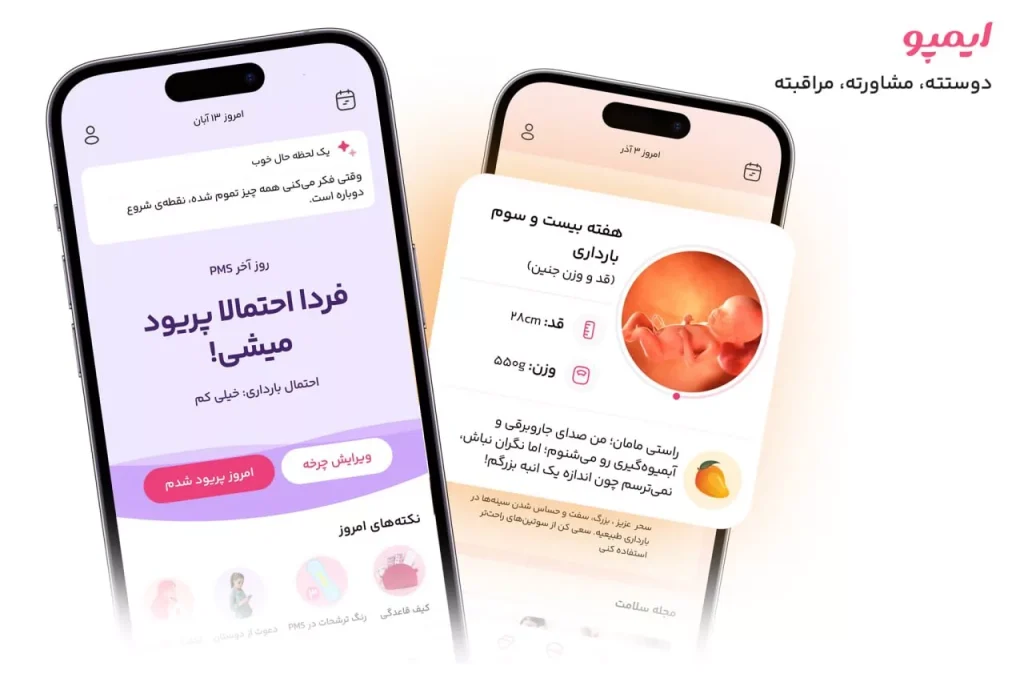
He continued: “Through research, we found that women crave greater self-belief and confidence during their menstrual cycles. This insight became our rallying cry, driving user adoption and Impo’s rapid growth. Today, Impo has nearly 2 million users, including those in Afghanistan, Tajikistan, and beyond.”
On operational challenges, Sajjadi noted: “Digital businesses in Iran face hurdles like internet censorship. Access to platforms like Google Play Store and the App Store is extremely limited, making app updates and distribution a major struggle.”
Resistance to Self-Care Apps
Sajjadi also highlighted how VPN usage disrupts app functionality: “When users have VPNs active on their phones, it interferes with app performance.” He stressed another barrier: “In some regions, societal norms still resist the use of self-care apps. The reality is, many in Iran still avoid these tools—the entire market here might only have around 10 million users.”
He elaborated: “The number of app users remains small compared to the potential audience. If we consider women of reproductive age, plus those who are postmenopausal, the target demographic could be around 30 million. This gap shows how critical cultural education is to normalize these tools.”
By confronting technical, financial, and cultural obstacles, Impo’s journey underscores both the progress and persistent challenges in leveraging technology to empower women in restrictive environments.
"Yek Zan" Aims to Educate Men, Too
Yek Zan ("A Woman"), an app dedicated to women’s health and education, launched in 2018 (1397 Persian calendar). The app’s product manager told Digiato: “We also designed a complementary app called Gentleman to raise men’s awareness about women’s health issues, including menstruation, PMS, and more.”
Mehran Asghari, the manager, noted that after six years of operation, the app has surpassed 1.5 million users. He added: “Recent updates include features like nutrition tracking (calorie counting and personalized diet plans), fitness programs (yoga and exercise routines), and online educational courses.”
Like Impo’s co-founder, Asghari emphasized cultural barriers and systemic knowledge gaps: “Cultural taboos and the lack of essential education—especially during formative years like high school—make apps like these critical for empowering both women and men with vital health information.”
By addressing gendered gaps in health literacy, Yek Zan and its companion app reflect a growing recognition that dismantling taboos requires engaging all members of society, not just women.

The Consequence of Ignorance
According to Asghari, "Despite the abundance of information circulating on social media, many women still lack basic knowledge about their menstrual cycles and bodily changes like PMS. They also have little awareness of issues such as contraception methods, which leads to infections and repeated, unwanted abortions. However, these same apps can help prevent all of these issues by providing essential information and reminders for regular check-ups."
The product manager of the "Yek Zan" (One Woman) app, highlighting the challenges in this field, explains: "The lack of necessary government support—such as tax exemptions or banking facilities for app development and maintenance—coupled with users' reduced purchasing power due to economic conditions, existing sanctions, and difficulties in using online tools, are some of the challenges we face."
Amid these challenges, new technologies like "AI and service personalization" have become a major global focus in recent years. As a result, apps in this field have reached a new level of personalization and accuracy. These applications not only track menstrual cycles and pregnancy but also analyze user data to provide more precise health and medical recommendations.
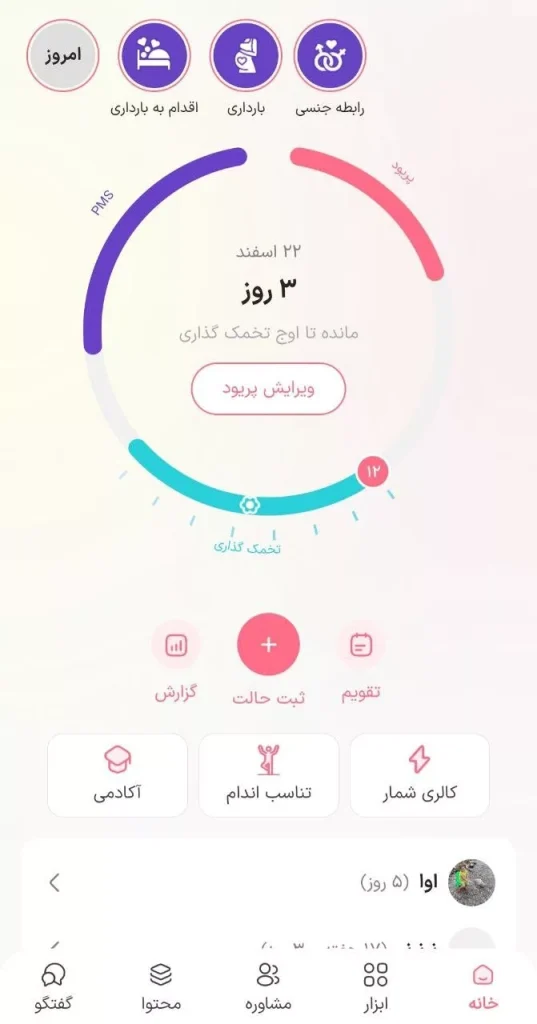
AI Services in 1404 (2025-2026)
Asghari explains: "Like many other Iranian apps, 'Yek Zan' (One Woman) is striving to provide better and more practical services to its users by implementing AI-powered features. This is one of our top priorities for the new year."
These remarks from women's health startup founders come at a time when many social experts emphasize: "Caring for women benefits not only them but the entire society and future generations." They argue that women, through their multiple roles in the family (as mothers, wives, caregivers) and society (as professionals and social activists), contribute to the flourishing of future generations and societal progress.
Given the importance of women's well-being and its impact on Iran's future, there is a need for both cultural initiatives and a reconsideration of internet filtering as a major obstacle for online businesses. We hope the authorities’ promises to lift filtering will not remain mere words and that this significant barrier will be permanently removed for online market players.












